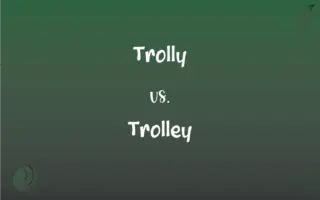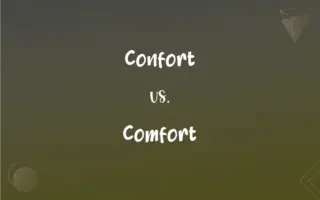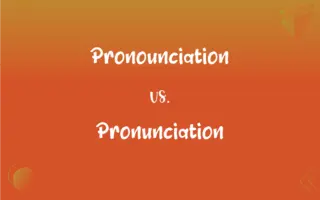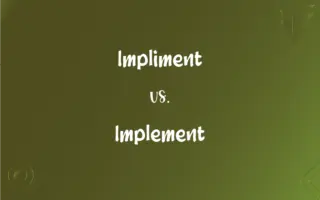Conclussion vs. Conclusion: Mastering the Correct Spelling
Edited by Janet White || By Harlon Moss || Updated on March 8, 2024
"Conclussion" is an incorrect spelling; the orrect spelling is "conclusion." Conclusion means the end or finish of an event, process, or text.
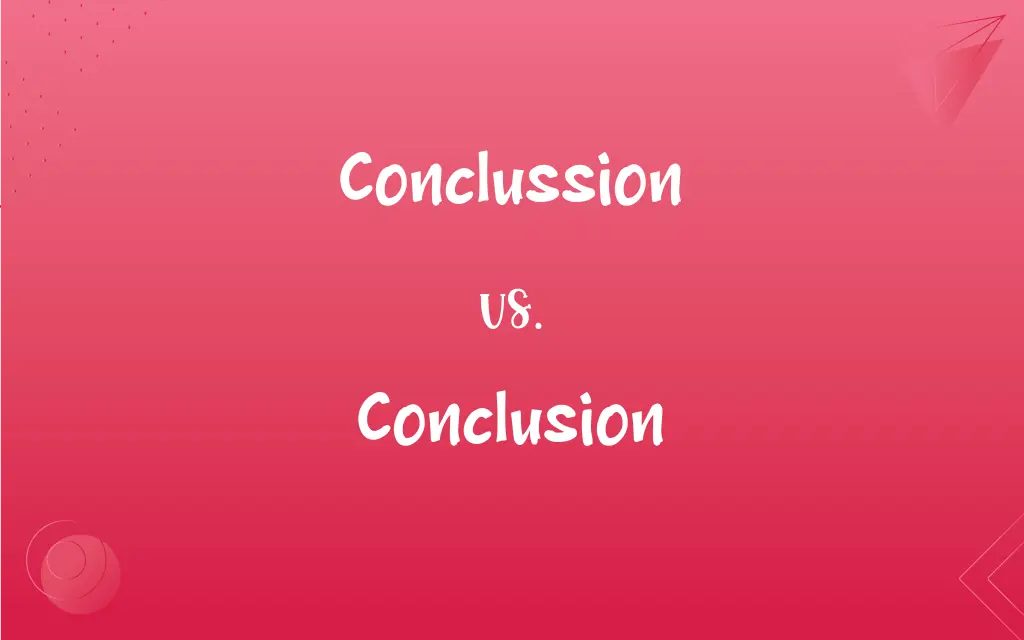
Which is correct: Conclussion or Conclusion
How to spell Conclusion?

Conclussion is Incorrect

Conclusion is Correct
ADVERTISEMENT
Key Differences
The word 'conclusion' sounds like it has a shorter middle section, matching its shorter spelling.
'Conclusion' is derived from the verb 'conclude', which also has a single 's'.
The word 'conclusion' is visually shorter and more concise, fitting its meaning of bringing things to a close.
'Conclusion' has three consonants in a row, not four.
Remember that 'conclusion' has only one 's' like in 'simple'.
ADVERTISEMENT
Correct usage of Conclusion
What was the conclussion of the meeting?
What was the conclusion of the meeting?
The report ended with a weak conclussion.
The report ended with a weak conclusion.
His speech lacked a strong conclussion.
His speech lacked a strong conclusion.
The study came to an unclear conclussion.
The study came to an unclear conclusion.
They reached a mutual conclussion after the debate.
They reached a mutual conclusion after the debate.
Conclusion Definitions
A conclusion is the final part of something, summarizing its main points.
The report's conclusion highlighted the key findings.
In narrative, a conclusion is the final section that wraps up the story.
The novel's conclusion resolved all the character's dilemmas.
In logic, a conclusion is a judgment or decision reached by reasoning.
His conclusion was based on facts presented in the argument.
A conclusion is the end or finish of an event or process.
The concert came to an exciting conclusion.
A conclusion can also be an agreement or arrangement reached after consideration.
They came to a conclusion after lengthy negotiations.
The close or last part; the end or finish
The conclusion of the festivities.
The result or outcome of an act or process
What was the conclusion of all these efforts?.
Conclusion Sentences
The conclusion of the book left readers wanting more.
She came to the conclusion that it was better to leave.
After much thought, he reached a conclusion about his future.
The meeting came to a conclusion after two hours.
The lawyer presented her conclusion to the jury.
The conclusion of the experiment confirmed their hypothesis.
It's hard to draw a conclusion without all the information.
They finally reached a conclusion on the deal.
The conclusion of the presentation was the most impactful part.
In conclusion, the project was deemed a success.
She wrote a strong conclusion for her essay.
The debate did not come to a definitive conclusion.
The conclusion of their argument was unexpectedly peaceful.
The investigation's conclusion was that no laws were broken.
The conclusion of the story was both surprising and satisfying.
The conclusion of the film left everyone in tears.
The seminar's conclusion was open to audience questions.
In conclusion, we must strive for better communication.
He outlined his conclusion in the final chapter.
Her conclusion was based on faulty assumptions.
They awaited the judge's conclusion anxiously.
The conclusion to the series will be broadcast next week.
The conference will come to a conclusion tomorrow.
The research paper needs a clearer conclusion.
The conclusion of the symphony was met with applause.
Conclusion Idioms & Phrases
A conclusion of law
A decision by a judge about an issue of law.
The judge made a conclusion of law that affected the trial's outcome.
In conclusion
A phrase used to introduce the final part of a speech or piece of writing.
In conclusion, I would like to thank everyone for their hard work.
A logical conclusion
A result that naturally follows from the given facts or arguments.
Given the clues, the detective arrived at a logical conclusion.
Come to a conclusion
To make a decision or form an opinion after considering all the information.
After much discussion, they finally came to a conclusion.
Reach a conclusion
To arrive at a decision or opinion after careful thought.
The committee reached a conclusion after several meetings.
Draw a conclusion
To make a judgment or infer something based on evidence or reasoning.
Based on the evidence, we can draw a conclusion about the suspect's guilt.
Foregone conclusion
A result that is obvious or expected before it happens.
The outcome of the match was a foregone conclusion.
To leap to a conclusion
Similar to jumping to conclusions, it means to arrive at a judgment without considering all the facts.
He's always quick to leap to a conclusion.
At the conclusion of
At the end of something.
At the conclusion of the concert, the audience gave a standing ovation.
A tentative conclusion
A conclusion that is not final and might change.
The scientists reached a tentative conclusion pending further data.
Come to the conclusion that
To decide something after thinking about it.
She came to the conclusion that changing jobs was necessary for her happiness.
A hasty conclusion
A decision made too quickly, possibly without all of the necessary information.
They made a hasty conclusion about the cause of the accident.
The ultimate conclusion
The final or most important decision or result.
The ultimate conclusion was that the project was not feasible.
An unsatisfactory conclusion
A conclusion that does not satisfy all parties involved.
The negotiations came to an unsatisfactory conclusion.
Jumping to the wrong conclusion
To make an incorrect judgment or assumption.
He regretted jumping to the wrong conclusion about his friend's actions.
Bring to a conclusion
To finish or complete something.
The project was finally brought to a conclusion after many delays.
Beyond conclusion
Beyond any doubt or argument.
His honesty is beyond conclusion.
An inevitable conclusion
A conclusion that is certain to happen.
Given the circumstances, resignation was the inevitable conclusion.
To the conclusion that
Used to express the final judgment or decision.
They came to the conclusion that more research was needed.
FAQs
What is the verb form of conclusion?
The verb form of conclusion is "conclude."
What is the pronunciation of conclusion?
Conclusion is pronounced as /kənˈkluː.ʒən/.
Which preposition is used with conclusion?
"In" is commonly used, as in "in conclusion."
What is the root word of conclusion?
The root word of conclusion is the Latin 'concludere', meaning 'to close, shut up'.
What is the singular form of conclusion?
The singular form is "conclusion."
Which conjunction is used with conclusion?
"Therefore" is a conjunction often used with conclusions.
Is conclusion an abstract noun?
Yes, conclusion is an abstract noun.
Is conclusion a noun or adjective?
Conclusion is a noun.
Which vowel is used before conclusion?
Typically, the vowel 'a' is used before conclusion, as in "a conclusion."
Why is it called conclusion?
It's called a conclusion because it concludes or brings to an end a discussion, argument, or text.
What is the plural form of conclusion?
The plural form is "conclusions."
Is the word conclusion imperative?
No, conclusion is not an imperative; it's a noun.
Which article is used with conclusion?
The indefinite article "a" is used, as in "a conclusion."
Is conclusion an adverb?
No, conclusion is not an adverb.
Is the conclusion term a metaphor?
It can be used metaphorically in certain contexts.
How do we divide conclusion into syllables?
Conclusion is divided as con-clu-sion.
What is another term for conclusion?
Another term is "finale" or "summation."
What is the second form of conclusion?
There is no second form as conclusion is a noun.
How is conclusion used in a sentence?
Example: "After extensive research, the scientist reached a significant conclusion."
Is conclusion a negative or positive word?
Conclusion is neutral; it can be positive or negative based on context.
Is conclusion a countable noun?
Yes, conclusion is a countable noun.
Which determiner is used with conclusion?
Determiners like "the," "a," or "this" are used with conclusion.
How many syllables are in conclusion?
Conclusion has three syllables.
What is the opposite of conclusion?
The opposite of conclusion is "introduction" or "beginning."
What is the first form of conclusion?
The first form is "conclusion" itself.
What is the third form of conclusion?
There is no third form as conclusion is a noun.
Is conclusion a vowel or consonant?
Conclusion is neither; it's a noun. But it starts with the consonant 'c'.
Is conclusion a collective noun?
No, conclusion is not a collective noun.
What is a stressed syllable in conclusion?
The stressed syllable is 'clu' in conclusion.
What part of speech is conclusion?
Conclusion is a noun.
About Author
Written by
Harlon MossHarlon is a seasoned quality moderator and accomplished content writer for Difference Wiki. An alumnus of the prestigious University of California, he earned his degree in Computer Science. Leveraging his academic background, Harlon brings a meticulous and informed perspective to his work, ensuring content accuracy and excellence.
Edited by
Janet WhiteJanet White has been an esteemed writer and blogger for Difference Wiki. Holding a Master's degree in Science and Medical Journalism from the prestigious Boston University, she has consistently demonstrated her expertise and passion for her field. When she's not immersed in her work, Janet relishes her time exercising, delving into a good book, and cherishing moments with friends and family.
